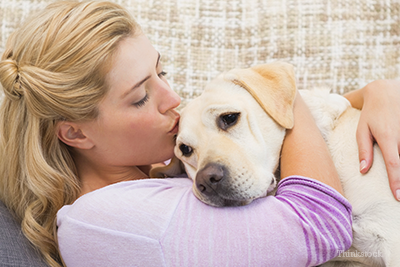
Learning that your dog has cancer can be a traumatic experience and can lead to feelings of grief, anger, fear and even guilt. The entire experience is both emotionally and physically draining as pet guardians deal with the stress of coping with the diagnosis, driving their pet to frequent appointments and struggling to give their pet daily medications. When faced with the daily stresses of treating your dog with cancer, it helps to remember that you are doing this for your beloved pet. Here are 5 tips to help pet guardian’s better cope with their dog’s radiation or chemotherapy treatments.
1. Know what to expect
Having realistic expectations will help you avoid unexpected surprises and disappointments. It is important for pet parents to recognize that, while remission is the ultimate goal, quality of life is equally as important. As a result, cancer treatments in dogs are generally less aggressive than those used in people. Nevertheless, dogs, like humans, may experience many of the same side effects. These include:
- Lethargy
- Vomiting
- Diarrhea
- Lack of appetite
- Others (as discussed with your veterinarian)
Your veterinarian will discuss the most common side effects that your dog is most likely to experience from the cancer treatment. Before starting your dog’s treatment, become familiar with these side effects so that you know what to look for.
2. Keep a journal
Knowledge is king. Be sure to keep a journal that records every treatment, when it was administered and any side effects that your dog may develop. For example, write down if your dog is eating less, seems lethargic, has diarrhea or is vomiting. By keeping track of any side effects and when they occur, you can communicate this valuable information to your veterinarian. Taking care of a dog undergoing cancer treatment can be overwhelming and it is easy to lose track of information. Keeping a journal helps you organize this information so that you can share it your veterinarian.
3. Talk to your veterinarian
Remember that you and your veterinarian are a team. In order to help your dog get the best care possible, it is essential for both of you to work together. For example, if you keep a journal about your dog’s treatments, you can share information about side effects with your veterinarian so that your veterinarian can better manage side effects from chemotherapy or radiation. By treating and controlling side effects like nausea, lack of appetite, vomiting, lethargy and weight loss, your veterinarian can help your dog be comfortable and enjoy a good quality of life during treatment.
4. Join a support group
Watching your furry friend get diagnosed with cancer and undergo chemotherapy or radiation can be overwhelming. Although everyone deals with it differently, it is important for everyone to know that you are not alone. There are pet cancer support groups available to help you cope. Remember, you can also speak with your veterinarian and veterinary team. After all, no one understands the special bond shared between you and your dog better than your veterinarian. The key point is to reach out and find the emotional support that you need.
5. Enjoy every day
The sad reality is that pets do not live as long as people do. As a consequence, we will all have to say goodbye to our dogs at some point. Unfortunately, diseases like cancer can shorten our dogs’ already short life spans. So remember to cherish everyday with your dog. Take walks together, go to the dog park and cuddle with your pooch as often as possible.
If you have any questions or concerns, you should always visit or call your veterinarian -- they are your best resource to ensure the health and well-being of your pets.
